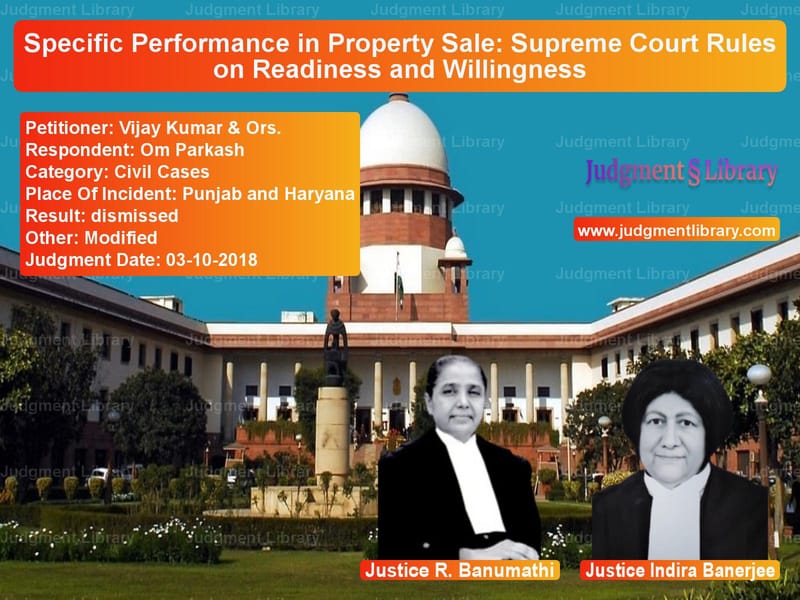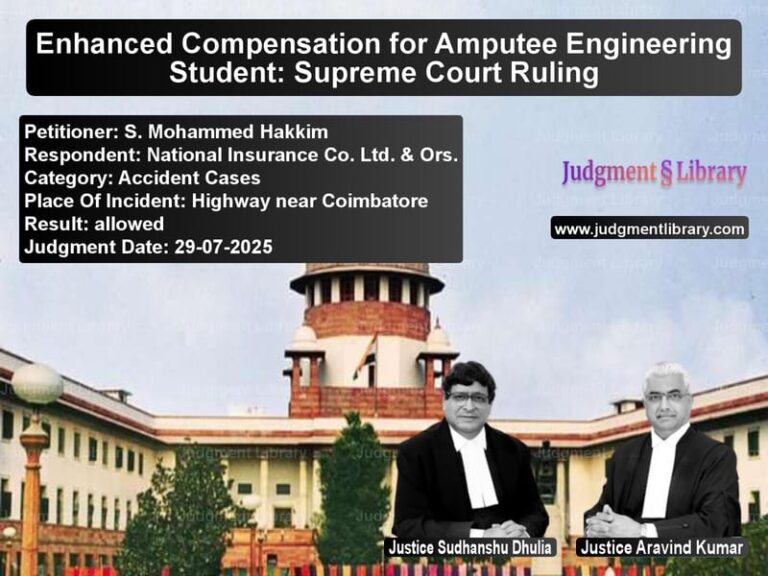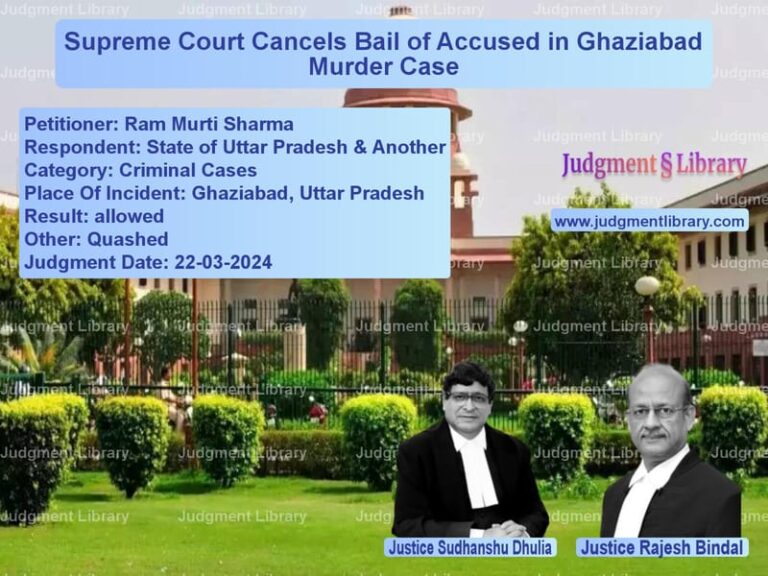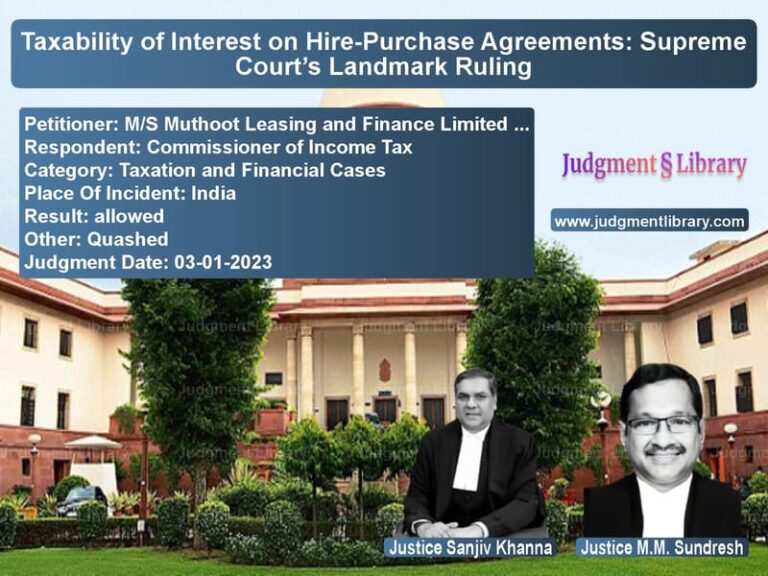Specific Performance in Property Sale: Supreme Court Rules on Readiness and Willingness
The Supreme Court of India, in its judgment in Vijay Kumar & Ors. vs. Om Parkash, delivered on October 3, 2018, provided a significant ruling regarding the specific performance of a contract for the sale of immovable property. The judgment focused on whether the plaintiff had demonstrated readiness and willingness to perform the contract and the discretionary nature of granting specific performance.
Background of the Case
The dispute arose from an agreement for sale executed on November 9, 2007, between the appellants (defendants) and the respondent (plaintiff) for a commercial shop, with a total consideration of Rs. 26,00,000. The respondent-plaintiff paid an earnest amount of Rs. 4,00,000 at the time of the agreement, and the remaining amount of Rs. 22,00,000 was to be paid by March 31, 2008, the agreed-upon date for executing the sale deed.
However, on the scheduled date, although both parties were present at the Sub-Registrar’s office, the sale deed was not executed, leading to a legal dispute. The respondent-plaintiff filed a suit for specific performance on April 29, 2008, alleging that the appellants-defendants had refused to honor the agreement.
Arguments by the Petitioner (Vijay Kumar & Ors.)
- The defendants argued that the plaintiff was not ready and willing to perform his part of the contract.
- They contended that the plaintiff had failed to show financial capability to pay the remaining amount.
- They emphasized that mere presence at the Sub-Registrar’s office did not prove readiness and willingness.
Arguments by the Respondent (Om Parkash)
- The plaintiff claimed he had arranged the money through loans from friends and was willing to pay the balance.
- He argued that the defendants had backed out of the sale despite his willingness to complete the transaction.
- He stated that he had deposited the remaining amount of Rs. 22,00,000 before the First Appellate Court.
Trial Court’s Decision
The Trial Court ruled in favor of the defendants, holding that the plaintiff had failed to prove readiness and willingness. It observed:
- The plaintiff did not produce any documentary evidence to show he had the required funds on the relevant date.
- He failed to provide bank statements, passbooks, or any other proof of his financial ability.
- Mere claims of borrowing money from friends were insufficient to establish readiness and willingness.
High Court’s Reversal
The First Appellate Court overturned the Trial Court’s judgment, granting specific performance to the plaintiff. The High Court affirmed this decision, ruling that:
- The plaintiff had deposited the amount in 2015 before the Appellate Court, proving his financial capacity.
- The Trial Court had erred in denying specific performance based on technicalities.
Supreme Court’s Analysis and Judgment
The Supreme Court reviewed whether the plaintiff had met the legal requirements for specific performance and whether the lower courts had correctly applied the law.
Key Observations of the Court
- The Court reiterated that readiness and willingness to perform a contract must be proven continuously from the agreement date until the decree is passed.
- The burden was on the plaintiff to show that he had sufficient funds at the time of execution.
- The plaintiff’s claim of borrowing money from friends was not substantiated by documentary evidence.
- The fact that he deposited Rs. 22,00,000 in 2015 was irrelevant to proving financial readiness in 2008.
Final Ruling
- The Supreme Court set aside the High Court and First Appellate Court rulings.
- It reinstated the Trial Court’s judgment denying specific performance.
- The Court ordered that the earnest money of Rs. 4,00,000 be refunded to the plaintiff, with 12% interest from November 9, 2007, to October 3, 2018, and 10% interest thereafter.
Impact of the Judgment
The ruling has significant implications for property transactions and contract law:
- It reinforces the principle that a plaintiff must prove continuous readiness and willingness to obtain specific performance.
- It clarifies that financial capacity must be demonstrated at the relevant time, not years later.
- It sets a precedent that failure to provide documentary proof of funds can be a ground for denying specific performance.
Conclusion
The Supreme Court’s decision in Vijay Kumar vs. Om Parkash ensures that specific performance remains a discretionary remedy rather than an automatic right. By emphasizing the importance of proving financial readiness at the time of the contract, the judgment upholds fairness in real estate transactions and contract enforcement.
Petitioner Name: Vijay Kumar & Ors..Respondent Name: Om Parkash.Judgment By: Justice R. Banumathi, Justice Indira Banerjee.Place Of Incident: Punjab and Haryana.Judgment Date: 03-10-2018.
Don’t miss out on the full details! Download the complete judgment in PDF format below and gain valuable insights instantly!
Download Judgment: Vijay Kumar & Ors. vs Om Parkash Supreme Court of India Judgment Dated 03-10-2018.pdf
Direct Downlaod Judgment: Direct downlaod this Judgment
See all petitions in Specific Performance
See all petitions in Property Disputes
See all petitions in Damages and Compensation
See all petitions in Judgment by R. Banumathi
See all petitions in Judgment by Indira Banerjee
See all petitions in dismissed
See all petitions in Modified
See all petitions in supreme court of India judgments October 2018
See all petitions in 2018 judgments
See all posts in Civil Cases Category
See all allowed petitions in Civil Cases Category
See all Dismissed petitions in Civil Cases Category
See all partially allowed petitions in Civil Cases Category







